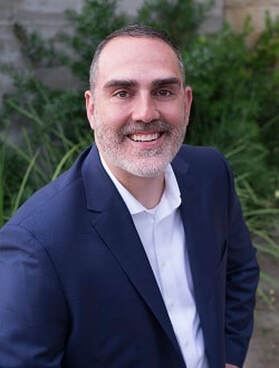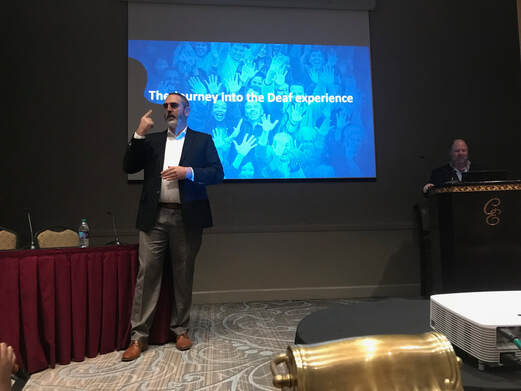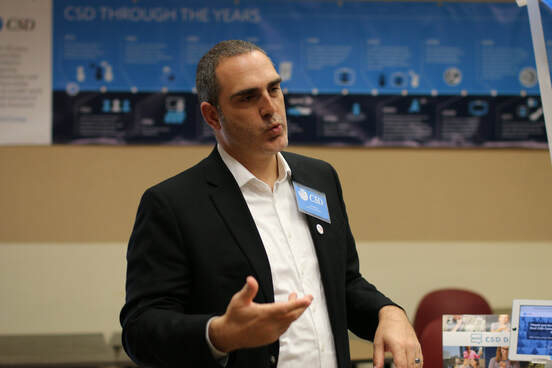June 2020 Featured Interview
Special Issue: Celebrating the Men in Our Lives
Craig Radford
Director of Connect Direct at Communication Service for the Deaf (CSD)
Photo Credit: Michael J. Samaripa
About Craig:
Craig Radford has been shaping the advancement of communication for the Deaf community for more than 20 years. He expanded employment opportunities as a two-time entrepreneur for his local community. He sold his companies, and four years ago, he helped launch Connect Direct, a subsidiary of Communication Service for the Deaf (CSD), and has worked with large organizations with like-minded accessibility goals, such as the American Red Cross, Comcast and Google, providing direct services in sign language for equitable communication access and creating employment opportunities within the deaf community.
Craig is a Certified Professional in Accessibility Core Competencies (CPACC) from the International Association of Accessibility Professionals (IAAP). He was Chairman of the Board of Directors for Utah Deaf Education and Literacy, Inc. He was on the coaching staff for the USA Deaf Olympic Basketball team.
As a speaker, author, coach, chairman, presenter and executive, he has impacted hearing and deaf communities alike in furthering accessibility, effective communication, and the creation of jobs specifically targeted for qualified deaf candidates. As a deaf professional in a hearing world, Craig has dedicated himself to closing the gap that exists between language and cultural barriers.
Craig Radford has been shaping the advancement of communication for the Deaf community for more than 20 years. He expanded employment opportunities as a two-time entrepreneur for his local community. He sold his companies, and four years ago, he helped launch Connect Direct, a subsidiary of Communication Service for the Deaf (CSD), and has worked with large organizations with like-minded accessibility goals, such as the American Red Cross, Comcast and Google, providing direct services in sign language for equitable communication access and creating employment opportunities within the deaf community.
Craig is a Certified Professional in Accessibility Core Competencies (CPACC) from the International Association of Accessibility Professionals (IAAP). He was Chairman of the Board of Directors for Utah Deaf Education and Literacy, Inc. He was on the coaching staff for the USA Deaf Olympic Basketball team.
As a speaker, author, coach, chairman, presenter and executive, he has impacted hearing and deaf communities alike in furthering accessibility, effective communication, and the creation of jobs specifically targeted for qualified deaf candidates. As a deaf professional in a hearing world, Craig has dedicated himself to closing the gap that exists between language and cultural barriers.
|
About Communication Service for the Deaf (CSD):
Since its founding in 1975, Communication Service for the Deaf (CSD) has provided advocacy, ASL interpreting, telecommunications relay, direct services between one deaf person and another, and other support services to the Deaf and Hard of Hearing community, serving well over 100,000 deaf individuals and reaching millions more. As the world’s largest Deaf-led nonprofit, CSD’s services reach all fifty states in the U.S. as well as internationally, in countries such as New Zealand and Australia. |
|
Myrna Beth Haskell, managing editor, spoke with Craig about CSD, the services that Connect Direct provides, and both his personal and professional journeys.
What was CSD’s original mission and has this changed over time?
CSD originally provided support for access and independence for the deaf community at large. The organization ensured that the deaf community had the ability to have equal access to employment and education.
We’ve evolved since then. We focus more on educating businesses and organizations so they understand the social impact – there’s a large, capable deaf community that can be accessed for employment.
What was CSD’s original mission and has this changed over time?
CSD originally provided support for access and independence for the deaf community at large. The organization ensured that the deaf community had the ability to have equal access to employment and education.
We’ve evolved since then. We focus more on educating businesses and organizations so they understand the social impact – there’s a large, capable deaf community that can be accessed for employment.
|
|
You are director of Connect Direct. Could you explain how this arm of CSD supports companies by providing technical supports in ASL?
For the deaf, English is not a first language. The native language is ASL (American Sign Language). There are millions of deaf and hard of hearing people in the U.S., and ASL is the third most used language behind English. We want to see a world where ASL interpreting services are available to the deaf community in the same way that Spanish-speaking interpreting services are available. You also have to understand that when someone uses an interpreter, there is not 100% accurate interpretation. Many times it’s hit or miss. The quality of the interpretation depends on a lot of factors – such as compatibility and fit. Is the interpreter male or female? Perhaps a female is the only interpreter available for a male. |
We’re the first organization to provide a truly equitable experience for the deaf and hard of hearing. In the 1970s and 1980s, TTY (teletypewriters) were used. [TTY - a special device that allows people who are deaf or hard of hearing to use the telephone to communicate by typing messages back and forth to one another, instead of talking and listening. A TTY is required at both ends of the conversation in order to communicate.] There were huge challenges. There was a three to five second delay, so the language flow was much different. VRS (video relay services) is newer. [In 1999, CSD initiated a full-scale video relay service (VRS) and video remote interpreting (VRI) tests.]
But Connect Direct goes a step further. The mission is to help companies eliminate the need for third-party translation. (csd.org)
Connect Direct provides both shadowing and consulting services. We help with everything - recruitment, hiring, training and retaining deaf employees. We also help companies eliminate the need for third-party translation.
But Connect Direct goes a step further. The mission is to help companies eliminate the need for third-party translation. (csd.org)
Connect Direct provides both shadowing and consulting services. We help with everything - recruitment, hiring, training and retaining deaf employees. We also help companies eliminate the need for third-party translation.
|
“We need to move beyond mere inclusion and accept that, no matter what categories we fall into, we all belong to one company, one culture, one world. Striving for equality means breaking down these power structures in a way that gives equal footing to anyone, regardless of background.” ~ Craig Radford |
Please elaborate on the following statement you wrote in an article titled "Beyond Mere Inclusion: Connect Direct is More than a Lifeline": "Most corporate cultures say the right things about the notion of diversity, but few actually accept the concept that inclusion means something much more than just tossing that lifeline."
From a disability perspective, companies need to be more 'proactive' by affording full access that benefits everyone, rather than being 'reactive' by providing accommodations. Having an interpreter present levels the playing field and provides an equitable experience for all parties involved. This interpreter is not my interpreter, but our interpreter. |
|
What does CSD do to train employers to develop a deaf-friendly environment? It depends on the organization. They’re all different. Some organizations require in-person visits to identify gaps. We look at everything from culture to training. We train the trainers with an interpreter. We also provide onsite ASL classes. Other companies prefer online services through video connection. We might interpret their training transcripts remotely, for instance. There is already a deaf community using supports, so we work with a list of top companies – cell phone providers, insurance companies, the IRS – these are places the deaf community is already accessing some services. VRS is administered by the FCC (Federal Communications Commission), and the FCC encouraged other organizations to get onboard. [On July 6, 2017, the FCC adopted a four-year rate plan to compensate video relay service (VRS) providers, effective from July 1, 2017, through June 30, 2021.] |
Craig Delivering a Presentation at PACE
(Professional Association for Customer Engagement) Photo Courtesy: CSD |
What are some of the obstacles you’ve personally experienced in the workforce? How did you overcome them?
I’ve applied for many jobs. When a company would reach back out to me, typically, the first issue would be that I needed an interpreter. Their tone would suddenly change. I’ve had interviews cancelled or I would hear, ‘We’re no longer interested.’ Unfortunately, the assumption is that I have limited capability. I would have to be aggressive with the human resources department, but I would often wind up paying for my own interpreter – and I shouldn’t have to do this.
Once at the job, I need to attend meetings. I can book an interpreter in advance, but there are times that I have to meet immediately with my boss. A solution is to use VRI (video remote interpreter). But there’s still that awkward period where we’re waiting to ‘connect,’ and we don’t know what to do with the silence. So, I send a note ahead which explains the reason for the meeting. But these types of things take extra time.
I’ve applied for many jobs. When a company would reach back out to me, typically, the first issue would be that I needed an interpreter. Their tone would suddenly change. I’ve had interviews cancelled or I would hear, ‘We’re no longer interested.’ Unfortunately, the assumption is that I have limited capability. I would have to be aggressive with the human resources department, but I would often wind up paying for my own interpreter – and I shouldn’t have to do this.
Once at the job, I need to attend meetings. I can book an interpreter in advance, but there are times that I have to meet immediately with my boss. A solution is to use VRI (video remote interpreter). But there’s still that awkward period where we’re waiting to ‘connect,’ and we don’t know what to do with the silence. So, I send a note ahead which explains the reason for the meeting. But these types of things take extra time.
|
Craig Delivering a Presentation at Gallaudet University CSD Spotlight Tour
Photo Courtesy: CSD |
In your opinion, what does an ‘optimal’ future for the deaf include?
I envision a world where the deaf are hired for their merits. I don’t want to be evaluated because of my disability. I want to be evaluated for my talents and skills. I would really like to see unemployment go down for the deaf community* and to see easy access to the latest technology [in all types of work environments]. I live in Idaho, which is behind in terms of access, but there are lots of situations everywhere that can be problematic. Even going to a drive-thru restaurant can pose a problem. I drive up to the order window and, of course, I can’t order there. So, I drive to the next window. There’s usually a sigh of frustration because now the process has been [altered], and I have to drive around yet again. If I’m waiting to board a plane at the airport, I can’t hear the message ‘time to board.’ There are similar issues at hotels, amusement parks and elsewhere. I’ve learned to just follow the crowd and to listen to my intuition. *Only 53.3% of deaf people ages 25-64 were employed in 2017, compared to 75.8% of hearing people – an employment gap of 22.5%. (NationalDeafCenter.org) |
What do you still see a need for in terms of businesses having adequate supports in place for the deaf?
I would like to see the same level of supports that are provided for others who don’t speak English as a first language.
It’s really a win-win. Not long ago, I tried to buy a truck. The salesperson assumed I couldn’t afford it, so I went to another dealership. They were very accommodating, and I wound up buying a truck in two hours. Then, not too long afterward, my mom bought a car from the same dealership once she heard the story. If I book a cruise with a cruise line that accommodates with interpreted shows and dinners, I will probably bring my entire family on that cruise with me. These accommodations that companies provide wind up bringing in more business for them. There is an untapped market millions of deaf and hard of hearing people and their networks.
How has this pandemic affected the deaf community and what resources has CSD offered to help the deaf community cope?
Generally, the deaf community cannot access all information about what they need to do – the procedures about wearing masks, when to call the doctor, etc. They don’t have a full understanding about what’s going on.
We have a dedicated page with resources – Information for the Deaf Community about COVID-19/Coronavirus – which provides videos in ASL and a dedicated hotline where deaf representatives answer questions. We are working with our partners in order to provide the absolute best resources and tools for our community, such as National Deaf Therapy, which provides deaf counselors and therapists.
Any final thoughts?
It would be ideal if everyone works together to figure out a way to increase access for all. Silence doesn’t help. It’s better to say something than to accept the status quo.
I would like to see the same level of supports that are provided for others who don’t speak English as a first language.
It’s really a win-win. Not long ago, I tried to buy a truck. The salesperson assumed I couldn’t afford it, so I went to another dealership. They were very accommodating, and I wound up buying a truck in two hours. Then, not too long afterward, my mom bought a car from the same dealership once she heard the story. If I book a cruise with a cruise line that accommodates with interpreted shows and dinners, I will probably bring my entire family on that cruise with me. These accommodations that companies provide wind up bringing in more business for them. There is an untapped market millions of deaf and hard of hearing people and their networks.
How has this pandemic affected the deaf community and what resources has CSD offered to help the deaf community cope?
Generally, the deaf community cannot access all information about what they need to do – the procedures about wearing masks, when to call the doctor, etc. They don’t have a full understanding about what’s going on.
We have a dedicated page with resources – Information for the Deaf Community about COVID-19/Coronavirus – which provides videos in ASL and a dedicated hotline where deaf representatives answer questions. We are working with our partners in order to provide the absolute best resources and tools for our community, such as National Deaf Therapy, which provides deaf counselors and therapists.
Any final thoughts?
It would be ideal if everyone works together to figure out a way to increase access for all. Silence doesn’t help. It’s better to say something than to accept the status quo.





